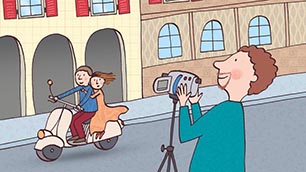| Connor: | Back and ready! |
| Silvia: | Mamma mia! You scared me! I didn’t hear you coming in! |
| Connor: | Silvia, this is funny... I heard my grandfather Giovanni saying Mamma mia! millions of times! |
| Silvia: | I bet you did. It is an extremely common Italian expression - both in Italy and around the world. |
| Connor: | He would say to my grandmother: Mamma mia, Carmela! La pasta! And then he would do something with his hand… like blowing a kiss with his fingers: Muah! He surely loved my grandmother‘s pasta. Which was really good, I have to tell you. |
| Silvia: | How many stories like this one do you have? |
| Connor: | Well, I could write a book about these two… real soul mates. |
| Silvia: | I can’t wait for you to tell me all about them in italiano. |
| Connor: | Mamma mia! I wish… |
| Silvia: | You’ll see, as you’ll learn some of the most common Italian expressions, not only will you make fast progress, but you will also sound like a real italiano! |
| Connor: | Io sono italiano, that is what I would like to say without an accent. |
| Silvia: | You know, having an accent is not a problem and can even be molto romantico. |
| Connor: | Mamma mia! A ragazza, in Italia, my vespa… it sounds like music to my ears. |
| Silvia: | Music?... It's so great to hear you say that, Connor! |
| Connor: | By the way, speaking of music... Silvia, do you know that song by ABBA called “Mamma mia!”? |
| Silvia: | Mamma mia! It was a hit back then and still is. Actually, this is the perfect example of a commonly used expression spreading to other cultures. And so widely did this one spread all over the world that it became the chorus for one of the most popular songs of all time. |
| Connor: | That’s true! But does Mamma mia! have anything to do with the word mother? What does it mean really? |
| Silvia: | Well, literally, the expression means my mother, but we never use it like that. In fact, to say my mother, we say mia mamma, switching the two words. |
| Connor: | I got it! |
| Silvia: | Mamma mia! is very often used to express surprise. For instance, I said that when you walked into the room earlier and I wasn’t expecting you. It can be translated in English as Oh My! or My Goodness! |
| Connor: | Mamma mia! Now I understand very well what you’re talking about! |
| Silvia: | Connor, sei uno studente molto bravo, you are a very good student. |
| Connor: | You are a very good professoressa. |
| Silvia: | Time to say goodbye, Connor, arrivederci! |
| Connor: | Ciao Silvia! Grazie! |





















